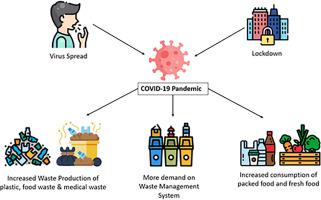Science of the Total Environment ( IF 8.2 ) Pub Date : 2021-02-20 , DOI: 10.1016/j.scitotenv.2021.145997 Walter Leal Filho 1 , Viktoria Voronova 2 , Marija Kloga 2 , Arminda Paço 3 , Aprajita Minhas 4 , Amanda Lange Salvia 5 , Celia Dias Ferreira 6 , Subarna Sivapalan 7

|
Apart from the health aspects and the high death toll, the COVID-19 pandemic has, since its official recognition in March 2020 caused may social and economic problems. It has also led to many environmental ones. For instance, the lockdowns have led to higher levels of consumption of packaged products, and of take-away food.
This paper reports on an international study on the increased consumption and subsequent changes in the amounts of waste produced since the COVID-19 pandemic. The results show that 45–48% of the respondents observed an increased consumption of packed food, fresh food, and food delivery. One of the main reasons for the increased waste generation during the lockdown was the fact that people have spent more time at home. In addition, increases of 43% and 53% in food waste and plastic packaging. Drawing from comparisons on the amount of domestic waste produced before and during the pandemic, the findings suggest that some specific types of municipal waste have visibly increased, putting additional pressure on waste management systems. This characterises one of non-intended effects of the COVID-19 pandemic. The results from this study provide useful insights to city administrations and municipal utilities on consumption patterns during emergency situations. This, in turn, may support more systemic and strategic measures to be taken, so as to curtail the increase of household waste during pandemic situations.
中文翻译:

COVID-19 和家庭废物产生:趋势分析
除了健康方面和高死亡人数外,自 2020 年 3 月被官方承认以来,COVID-19 大流行还造成了社会和经济问题。这也导致了许多环境问题。例如,封锁导致包装产品和外卖食品的消费量增加。
本文报告了一项国际研究,内容涉及自 COVID-19 大流行以来产生的废物量的增加和随后的变化。结果显示,45-48% 的受访者观察到包装食品、新鲜食品和外卖的消费有所增加。封锁期间垃圾产生量增加的主要原因之一是人们待在家里的时间更多。此外,食物垃圾和塑料包装分别增加了 43% 和 53%。通过对大流行之前和期间产生的生活垃圾数量进行比较,调查结果表明,某些特定类型的城市垃圾明显增加,给垃圾管理系统带来了额外压力。这是 COVID-19 大流行的非预期影响之一。这项研究的结果为城市管理部门和市政公用事业部门提供了有关紧急情况下消费模式的有用见解。反过来,这可能会支持采取更多系统性和战略性措施,以减少大流行期间家庭垃圾的增加。











































 京公网安备 11010802027423号
京公网安备 11010802027423号